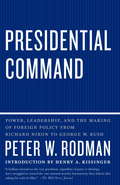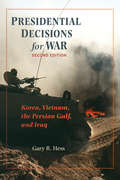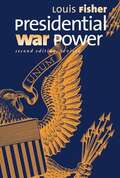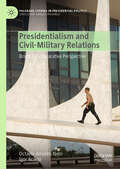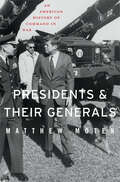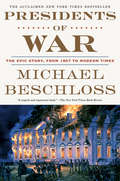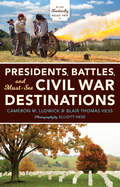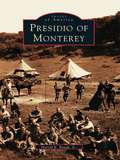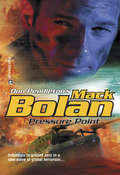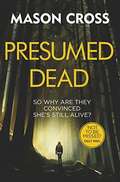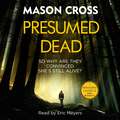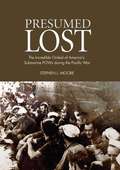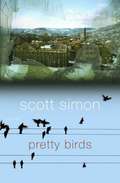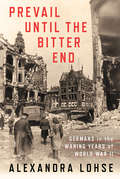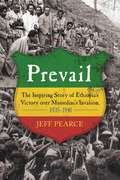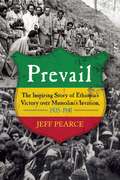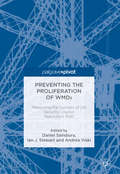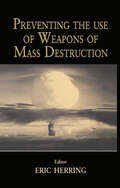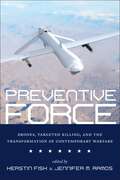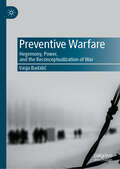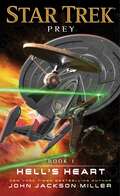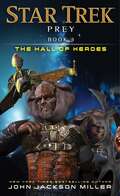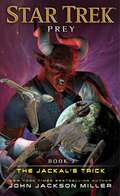- Table View
- List View
Presidential Command: Power, Leadership, and the Making of Foreign Policy from Richard Nixon to George W. Bush
by Peter W. RodmanRodman examines the foreign-policy methods of every Republican president from Nixon to George W. Bush. In an analysis of the various agencies and departments that manage foreign-policy, Rodman works to clarify the entangled bureaucracy that can lead to conflicts of interest between the agencies and the commander in chief.
Presidential Decisions for War: Korea, Vietnam, the Persian Gulf, and Iraq (The American Moment)
by Gary R. HessFollowing World War II, Americans expected that the United States would wage another major war against a superpower. Instead, the nation has fought limited wars against much weaker states, such as North Korea, North Vietnam, and Iraq. This revised and updated edition of Presidential Decisions for War analyzes the means by which four presidents have taken the nation to war and assesses the effectiveness of each president's leadership during those conflicts. Gary Hess recreates the unfolding crises in Korea, Vietnam, and Iraq to probe the reasons why Presidents Truman, Johnson, George H. W. Bush, and George W. Bush and their advisors decided in favor of war. He compares the performance of the commanders-in-chief and evaluates how effectively each understood U.S. interests, explored alternatives to war, adhered to constitutional processes, and built congressional, popular, and international support. A new conclusion points out, that unlike the administrations of Truman, Johnson, and the elder Bush, George W. Bush's White House actively sought to change the international order through preemptive war and aggressive democracy building. Fully revised and featuring an examination of how each of the presidents learned from history and juggled the demands on diplomacy, this comparative study of presidential war-making elucidates how effective executive leadership—or its absence—directly affects the outcome of wars.
Presidential War Power
by Louis FisherSpanning the life of the Republic from the Revolutionary Era to the nation's post-9/11 wars, this edition covers military initiatives, the Iraq Resolution of 2002, George W. Bush's "preemption doctrine," and his order authorizing military tribunals.
Presidentialism and Civil-Military Relations: Brazil in Comparative Perspective (Palgrave Studies in Presidential Politics)
by Octavio Amorim Neto Igor AcácioIn an era of resurgent military political activism, this volume examines the cross-national drivers of cabinet militarization in democratic regimes, and provides an in-depth study of its causes and consequences in Brazil.
Presidents and Their Generals: An American History of Command in War
by Matthew MotenA military historian traces the long struggle of American presidents to assert their power over uncooperative generals.Since World War II, the United States has been engaged in near-constant military conflict abroad, often with ill-defined objectives, ineffectual strategy, and uncertain benefits. In this era of limited congressional oversight and “wars of choice,” the executive and the armed services have shared the primary responsibility for making war. The negotiations between presidents and their generals thus grow ever more significant, and understanding them becomes essential.Matthew Moten traces a sweeping history of the evolving roles of civilian and military leaders in conducting war, demonstrating how war strategy and national security policy shifted as political and military institutions developed, and how they were shaped by leaders’ personalities. Early presidents established the principle of military subordination to civil government, and from the Civil War to World War II the president’s role as commander-in-chief solidified, with an increasingly professionalized military offering its counsel. But General Douglas MacArthur’s insubordination to President Harry Truman during the Korean War put political-military tensions on public view. Subsequent presidents selected generals who would ally themselves with administration priorities. Military commanders in Vietnam, Iraq, and Afghanistan did just that—and the results were poorly conceived policy and badly executed strategy.The most effective historical collaborations between presidents and their generals were built on mutual respect for military expertise and civilian authority, and a willingness to negotiate with candor and competence. Upon these foundations, future soldiers and statesmen can ensure effective decision-making in the event of war and bring us closer to the possibility of peace.Praise for Presidents and Their Generals“This highly readable book, impressive in scope, is a major contribution to understanding the important yet often-shifting dynamics of civil-military relations in the U.S.?past, present, and future.” —W. A. Taylor, Choice“The author's opinions are precise and witty and based on comprehensive knowledge of his subject, as he clearly demonstrates how wars are lost by the arrogant and/or incompetent. A brilliant, fascinating picture of how wars badly begun and poorly run can affect an entire country?usually at the hands of just a few men.” —Kirkus Reviews (starred review)
Presidents of War
by Michael BeschlossFrom a preeminent presidential historian comes a groundbreaking and often surprising saga of America’s wartime chief executives Ten years in the research and writing, Presidents of War is a fresh, magisterial, intimate look at a procession of American leaders as they took the nation into conflict and mobilized their country for victory. It brings us into the room as they make the most difficult decisions that face any President, at times sending hundreds of thousands of American men and women to their deaths. <P><P> From James Madison and the War of 1812 to recent times, we see them struggling with Congress, the courts, the press, their own advisors and antiwar protesters; seeking comfort from their spouses, families and friends; and dropping to their knees in prayer. We come to understand how these Presidents were able to withstand the pressures of war—both physically and emotionally—or were broken by them. <P><P> Beschloss’s interviews with surviving participants in the drama and his findings in original letters, diaries, once-classified national security documents, and other sources help him to tell this story in a way it has not been told before. Presidents of War combines the sense of being there with the overarching context of two centuries of American history. This important book shows how far we have traveled from the time of our Founders, who tried to constrain presidential power, to our modern day, when a single leader has the potential to launch nuclear weapons that can destroy much of the human race. <P><b>A New York Times Bestseller</b>
Presidents, Battles, and Must-See Civil War Destinations: Exploring a Kentucky Divided
by Blair Thomas Hess Cameron M. Ludwick Elliott HessAs a border state and strategic territory, Kentucky was fiercely contested by the Union and the Confederacy and had ties to both Abraham Lincoln and Jefferson Davis. Kentucky natives and adventure aficionados Cameron M. Ludwick and Blair Thomas Hess plot the course for a fun-filled road trip through history and across the Bluegrass State in Presidents, Battles, and Must-See Civil War Destinations. Ludwick and Hess make planning a trip to historic Kentucky easy by exploring the history and stories behind each major site and highlighting nearby attractions you won't want to miss. Featuring step-by-step guidelines and exclusive tips on sites, monuments, and attractions from presidential homes to the best modern re-enactments, Presidents, Battles, and Must-See Civil War Destinations helps the whole family experience and enjoy history together.
Presidio of Monterey (Images of America)
by Harold E. Raugh Jr.The Presidio of Monterey is best known as the home of the post-World War II Defense Language Institute Foreign Language Center, the Department of Defense's acknowledged leader in foreign language training. It has, however, a much longer and rich history. After the United States seized Monterey in 1846, the U.S. Army began constructing Fort Mervine, which served a number of purposes until it was abandoned in 1866. In 1902-1903, a modern cantonment was built in the area. In 1904, the new post was officially renamed the Presidio of Monterey after a nearby Spanish fort established in 1770 that had fallen into disuse. Throughout the first half of the 20th century, the post was home to infantry and cavalry regiments, as well as an inductee reception center. The Military Intelligence Service Language School was moved to the Presidio of Monterey in 1946 and renamed the Army Language School in 1947; this evolved into the present-day Defense Language Institute Foreign Language Center.
Pressure Point (SuperBolan #94)
by Don PendletonA WORLD GONE MAD Jihad strikes the heart of Indonesia in a vicious terrorist onslaught to seize control of the entire region. The collusion of local extremist factions and the most powerful global terrorist network has produced a formidable enemy with the means--and the will--to inflict genocide. «- [As part of covert U.S. intervention in the crisis, Mack Bolan and key Stony Man operatives are tasked with finding the terrorists' stronghold and weapons of [mass destruction. But time is running out and the enemy's strategy and skill are putting the odds at zero for a successful mission. Americans are under siege in a world gone insanely wrong, and Bolan is at the epicenter of the madness. But he's been there before. And there's a way out. ...
Presumed Dead: Carter Blake Book 5 (Carter Blake #5)
by Mason CrossWhat do you know about the Devil Mountain Killer?'THEN. Adeline Connor was the Devil Mountain Killer's final victim. After she was gunned down, the murderer disappeared and the killing spree ended. NOW. Carter Blake has been hired to do what he does best: to find someone. But this time he's hunting a dead girl - Adeline Connor's brother is convinced she's still alive.But this town doesn't want an outsider digging up old business. And as Blake gets deeper into the case, it starts to become clear that the murders didn't ju st stop fifteen years ago.The killer is on the hunt again.
Presumed Dead: Carter Blake Book 5 (Carter Blake Series)
by Mason Cross'I absolutely LOVED it, move over Reacher, I have a new favourite hero.' Jenny Blackhurst***********'What do you know about the Devil Mountain Killer?'THENAdeline Connor was the Devil Mountain Killer's final victim. After she was gunned down, the murderer disappeared and the killing spree ended.NOWCarter Blake has been hired to do what he does best: to find someone. But this time he's hunting a dead girl - Adeline Connor's brother is convinced she's still alive.But this town doesn't want an outsider digging up old business. And as Blake gets deeper into the case, it starts to become clear that the murders didn't ju st stop fifteen years ago.The killer is on the hunt again.***************Praise for race against time thriller writer Mason Cross:'Mason Cross is a thriller writer for the future who produces the kind of fast-paced, high octane thrillers that I love to read.' Simon Kernick'Terrific stuff!' Ian Rankin'So pacy I'm exhausted! Definitely one to read if you like your thrillers thrilling' Emma Kavanagh
Presumed Dead: Carter Blake Book 5 (Carter Blake Series)
by Mason Cross'Mason Cross is a fast-paced, high octane thriller writer.' Simon KernickTHENFifteen years ago, an unidentified killer terrorised northern Georgia, killing hikers with two shots from a pistol, before disposing of the bodies along the remote trails and in the rivers in the vicinity of Blood Mountain. The killer was never brought to justice. NOWCarter Blake has returned home for the first time in many years. The visit stirs old memories, including a girl from school who vanished without a trace. Blake runs into the mother of the girl, who mentions a case she's come across in Georgia, where someone is convinced their relative is still alive, fifteen years on. Adeline Connor was the Blood Mountain Killer's last suspected victim. She vanished without a trace.So why is her brother so convinced she's still alive?'One of the best new series characters since Jack Reacher' Lisa Gardner Read by Eric Meyers(p) Orion Publishing Group 2018
Presumed Lost
by Stephen MooreWhen submarines failed to return to port from patrol, they were officially listed by the Navy as overdue and presumed lost. Loved ones were notified by the War Department that their siblings, spouses, and sons were missing in action and presumed lost. While 52 U.S. submarines were sunk during World War II, the Japanese took prisoners of war from the survivors of only seven of these lost submarines. Presumed Lost is the compelling story of the final patrols of those seven submarines and the long captivity of the survivors. Of the 196 sailors taken prisoner, 158 would survive the horrors of the POW camps, where torture, starvation, and slave labor were common. This is the most complete and accurate record of their captivity experiences ever compiled. Author Stephen L. Moore draws on personal interviews with the survivors, as well as on diaries, family archives, and POW statements to reveal new details and correct longstanding errors in previously published accounts. Moore's research brought to light the following facts: Most crewmen from USS Perch endured 1,298 days of captivity without their families ever being told that they were still alive. The Perch and USS Grenadier were so badly damaged by enemy depth-charge attacks that their crews were forced to scuttle their ships. USS Sculpin and USS S-44 went down fighting, with only forty-two men from the Sculpin being taken prisoner and half of them perishing on the way to Japan. USS Tang and USS Tullibee, victims of their own faulty, circling torpedoes, had few survivors, five of whom managed to escape from the sunken, burning Tang when it was 180 feet below the ocean surface. As many as six men survived the loss of USS Robalo after it struck a mine off Palawan, but none of those survived the prison camps. The book includes dozens of rare photos of the POWs, many of which have never before been published. Appendices include final muster rolls of the seven submarines and a complete list of the U.S. submariners who were held as POWs, with details of their various camps of internment.
Pretty Birds
by Scott SimonThe universally respected NPR journalist and bestselling memoirist Scott Simon makes a dazzling fiction debut. InPretty Birds, Simon creates an intense, startling, and tragicomic portrait of a classic character-a young woman in the besieged city of Sarajevo in the early 1990s. In the spring of 1992, Irena Zaric is a star on her Sarajevo high school basketball team, a tough, funny teenager who has taught her parrot, Pretty Bird, to do a decent imitation of a ball hitting a hoop. Irena wears her hair short like k. d. lang's, and she loves Madonna, Michael Jordan, and Johnny Depp. But while Irena rocks out and shoots baskets with her friends, her beloved city has become a battleground. When the violence and terror of "ethnic cleansing" against Muslims begins, Irena and her family, brutalized by Serb soldiers, flee for safety across the river that divides the city. If once Irena knew of war only from movies and history books, now she knows its reality. She steals from the dead to buy food. She scuttles under windows in her own home to dodge bullets. She risks her life to communicate with an old Serb school friend and teammate. Even Pretty Bird has started to mimic the sizzle of mortar fire. In a city starved for work, a former assistant principal offers Irena a vague job, "duties as assigned," which she accepts. She begins by sweeping floors, but soon, under the tutelage of a cast of rogues and heroes, she learns to be a sniper, biding her time, never returning to the same perch, and searching her targets for the "mist" that marks a successful shot. Ultimately, Irena's new vocation will lead to complex and cataclysmic consequences for herself and those she loves. As a journalist, Scott Simon covered the siege of Sarajevo. Here, in a novel as suspenseful as a John le Carré thriller, he re-creates the atmosphere of that place and time and the pain and dark humor of its people. Pretty Birds is a bold departure, and the auspicious beginning of yet another brilliant career for its author. From the Hardcover edition.
Prevail until the Bitter End: Germans in the Waning Years of World War II (Battlegrounds: Cornell Studies in Military History)
by Alexandra LohseIn Prevail until the Bitter End, Alexandra Lohse explores the gossip and innuendo, the dissonant reactions and perceptions of Germans to the violent dissolution of the Third Reich. Mobilized for total war, soldiers and citizens alike experienced an unprecedented convergence of military, economic, social, and political crises. But even in retreat, the militarized national community unleashed ferocious energies, staving off defeat for over two years and continuing a systematic murder campaign against European Jews and others. Was its faith in the Führer never shaken by the prospect of ultimate defeat?Lohse uncovers how Germans experienced life and death, investigates how mounting emergency conditions affected their understanding of the nature and purpose of the conflagration, and shows how these factors influenced the people's relationship with the Nazi regime. She draws on Nazi morale and censorship reports, features citizens' private letters and diaries, and incorporates a large body of Allied intelligence, including several thousand transcripts of surreptitiously recorded conversations among German prisoners of war in Western Allied captivity. Lohse's historical reconstruction helps us understand how ordinary Germans interpreted their experiences as both the victims and perpetrators of extreme violence. We are immersively drawn into their desolate landscape: walking through bombed-out streets, scrounging for food, burning furniture, listening furtively to Allied broadcasts, unsure where the truth lies. Prevail until the Bitter End is about the stories that Germans told themselves to make sense of this world in crisis.
Prevail: The Inspiring Story of Ethiopia's Victory over Mussolini's Invasion, 1935-1941
by Richard Pankhurst Jeff PearceIt was the war that changed everything, and yet it’s been mostly forgotten: in 1935, Italy invaded Ethiopia. It dominated newspaper headlines and newsreels. It inspired mass marches in Harlem, a play on Broadway, and independence movements in Africa. As the British Navy sailed into the Mediterranean for a white-knuckle showdown with Italian ships, riots broke out in major cities all over the United States.Italian planes dropped poison gas on Ethiopian troops, bombed Red Cross hospitals, and committed atrocities that were never deemed worthy of a war crimes tribunal. But unlike the many other depressing tales of Africa that crowd book shelves, this is a gripping thriller, a rousing tale of real-life heroism in which the Ethiopians come back from near destruction and win.Tunnelling through archive records, tracking down survivors still alive today, and uncovering never-before-seen photos, Jeff Pearce recreates a remarkable era and reveals astonishing new findings. He shows how the British Foreign Office abandoned the Ethiopians to their fate, while Franklin Roosevelt had an ambitious peace plan that could have changed the course of world history—had Chamberlain not blocked him with his policy on Ethiopia. And Pearce shows how modern propaganda techniques, the post-war African world, and modern peace movements all were influenced by this crucial conflict—a war in Africa that truly changed the world.Skyhorse Publishing, as well as our Arcade imprint, are proud to publish a broad range of books for readers interested in history--books about World War II, the Third Reich, Hitler and his henchmen, the JFK assassination, conspiracies, the American Civil War, the American Revolution, gladiators, Vikings, ancient Rome, medieval times, the old West, and much more. While not every title we publish becomes a New York Times bestseller or a national bestseller, we are committed to books on subjects that are sometimes overlooked and to authors whose work might not otherwise find a home.
Prevail: The Inspiring Story of Ethiopia's Victory over Mussolini's Invasion, 1935-?1941
by Richard Pankhurst Jeff PearceIt was the war that changed everything, and yet it's been mostly forgotten: in 1935, Italy invaded Ethiopia. It dominated newspaper headlines and newsreels. It inspired mass marches in Harlem, a play on Broadway, and independence movements in Africa. As the British Navy sailed into the Mediterranean for a white-knuckle showdown with Italian ships, riots broke out in major cities all over the United States.Italian planes dropped poison gas on Ethiopian troops, bombed Red Cross hospitals, and committed atrocities that were never deemed worthy of a war crimes tribunal. But unlike the many other depressing tales of Africa that crowd book shelves, this is a gripping thriller, a rousing tale of real-life heroism in which the Ethiopians come back from near destruction and win.Tunnelling through archive records, tracking down survivors still alive today, and uncovering never-before-seen photos, Jeff Pearce recreates a remarkable era and reveals astonishing new findings. He shows how the British Foreign Office abandoned the Ethiopians to their fate, while Franklin Roosevelt had an ambitious peace plan that could have changed the course of world history-had Chamberlain not blocked him with his policy on Ethiopia. And Pearce shows how modern propaganda techniques, the post-war African world, and modern peace movements all were influenced by this crucial conflict-a war in Africa that truly changed the world.
Preventing War: The United Nations and Macedonia
by Abiodun WilliamsDescribes the role the UN played in Macedonia.
Preventing the Proliferation of WMDs: Measuring The Success Of Un Security Council Resolution 1540
by Daniel Salisbury Ian J. Stewart Andrea ViskiThis edited volume provides a fresh analysis for researcher and practitioners regarding United Nations Security Council resolution 1540, the status of its implementation, and its future by providing an original evaluation of progress in implementation and challenges faced during the resolution’s first decade. In doing so, the book will consider the resolution’s utility as a non-proliferation tool with a view to identifying what further actions are required for the objectives and goals embodied by UNSCR 1540 to be achieved and sustained. The book progresses by exploring the history of the resolution, implementation trends, implementation from a regional perspective, challenges, and future ways forward. The book appeals to a wide readership of scholars, policymakers, and other stakeholders of the 1540 process.
Preventing the Use of Weapons of Mass Destruction
by Eric HerringThese studies concentrate on preventing the use of weapons of mass destruction. A common argument runs through all of the papers: that, while complacency must be avoided, much of the post-Cold War focus among Western governments on the threat posed by weapons of mass destruction is alarmist.
Preventive Force: Drones, Targeted Killing, and the Transformation of Contemporary Warfare
by Jennifer M. Ramos Kerstin FiskExamines the recent rise in the United States' use of preventive forceMore so than in the past, the US is now embracing the logic of preventive force: using military force to counter potential threats around the globe before they have fully materialized. While popular with individuals who seek to avoid too many “boots on the ground,” preventive force is controversial because of its potential for unnecessary collateral damage. Who decides what threats are ‘imminent’? Is there an international legal basis to kill or harm individuals who have a connection to that threat? Do the benefits of preventive force justify the costs? And, perhaps most importantly, is the US setting a dangerous international precedent? In Preventive Force, editors Kerstin Fisk and Jennifer Ramos bring together legal scholars, political scientists, international relations scholars, and prominent defense specialists to examine these questions, whether in the context of full-scale preventive war or preventive drone strikes. In particular, the volume highlights preventive drones strikes, as they mark a complete transformation of how the US understands international norms regarding the use of force, and could potentially lead to a ‘slippery slope’ for the US and other nations in terms of engaging in preventive warfare as a matter of course. A comprehensive resource that speaks to the contours of preventive force as a security strategy as well as to the practical, legal, and ethical considerations of its implementation, Preventive Force is a useful guide for political scientists, international relations scholars, and policymakers who seek a thorough and current overview of this essential topic.
Preventive Warfare: Hegemony, Power, and the Reconceptualization of War
by Vasja BadaličThis book provides a critical and comprehensive analysis of the reconceptualization of preventive warfare in the 21st Century. It discusses how the US launched and fought some wars to prevent future vague threats and how that practice has fundamentally undermined the legal system and the main principles of the use of force, in ways that not only further US dominance but shield powerful actors from accountability. The US redefined key legal concepts to set up a new legal framework for preventive warfare and, consequently, introduced new practices for carrying out preventive military operations. Drawing on a collection of case studies, on the changes in the jus ad bellum and jus in bello, focusing mainly on Afghanistan and Iraq and beyond, the book shows how violations of the law of war were persistently conducted in the 21st century by supposedly democratic countries who claimed to be upholding the law. It explores three types of preventive warfare – that is, preventive national self-defense, preventive on-the-spot reactions, and preventive “security” detention – to show how they blurred the line between civilians and legitimate military targets, and thus increased the risk of causing harm to civilians. The book speaks to students, scholars, and practitioners from the fields of criminology, law, international relations, political science, critical security studies, and critical military studies.
Prey: Hell's Heart (Star Trek #1)
by John Jackson MillerContinuing the milestone 50th anniversary celebration of Star Trek—an epic new trilogy that stretches from the events of The Original Series movie The Search for Spock to The Next Generation!When Klingon commander Kruge died in combat against James T. Kirk on the Genesis planet back in 2285, he left behind a powerful house in disarray—and a series of ticking time bombs: the Phantom Wing, a secret squadron of advanced Birds-of-Prey; a cabal of loyal officers intent on securing his heritage; and young Korgh, his thwarted would-be heir, willing to wait a Klingon lifetime to enact his vengeance. Now, one hundred years later, while on a diplomatic mission for the United Federation of Planets, Captain Jean-Luc Picard and the crew of the USS Enterprise are snared in the aged Korgh’s trap—and thrust directly in the middle of an ancient conflict. But as Commander Worf soon learns, Korgh may be after far bigger game than anyone imagines, confronting the Federation-Klingon alliance with a crisis unlike any it has ever seen!
Prey: The Hall of Heroes (Star Trek #3)
by John Jackson MillerContinuing the milestone 50th anniversary celebration of Star Trek—an epic new trilogy that stretches from the events of The Original Series movie The Search for Spock to The Next Generation!The Klingon Empire stands on the precipice. In the wake of violence from the cult known as the Unsung, paranoia threatens to break Chancellor Martok’s regime. Klingons increasingly call for a stronger hand to take control...one that Lord Korgh, master manipulator, is only too willing to offer. But other forces are now in motion. Assisted by a wily agent, the Empire’s enemies secretly conspire to take full advantage of the situation. Aboard the USS Titan, Admiral William T. Riker realizes far more than the Federation’s alliance with the Klingons is in danger. With the Empire a wounded animal, it could either become an attacker—or a target. Yet even as hostilities increase, Commander Worf returns to the USS Enterprise and Captain Jean-Luc Picard with a daring plan of his own. The preservation of both the Empire and the Federation alliance may hinge on an improbable savior leading a most unlikely force....
Prey: The Jackal's Trick (Star Trek)
by John Jackson MillerContinuing the milestone 50th anniversary celebration of Star Trek—an epic new trilogy that stretches from the events of The Original Series movie The Search for Spock to The Next Generation!The Klingon-Federation alliance is in peril as never before. Lord Korgh has seized control of the House of Kruge, executing a plot one hundred years in the making. The Klingon cult known as the Unsung rampages across the stars, striking from the shadows in their cloaked Birds-of-Prey. And the mysterious figure known as Buxtus Cross launches a scheme that will transform the Klingon Empire forever. Into danger flies Admiral William T. Riker and the USS Titan, charged with protecting the peace forged nearly a century before during the Khitomer Accords. Aided by Captain Jean-Luc Picard and the USS Enterprise, Riker and his officers scour the stars, seeking to find the Unsung and uncover the truth behind the conspiracy before time runs out. Yet even as Commander Worf departs on a deeply personal mission of honor, hidden sinister forces seek to turn the crisis to their advantage. And the conspirators’ plans threaten to spiral out of control, jeopardizing the very empire they aspire to rule.
